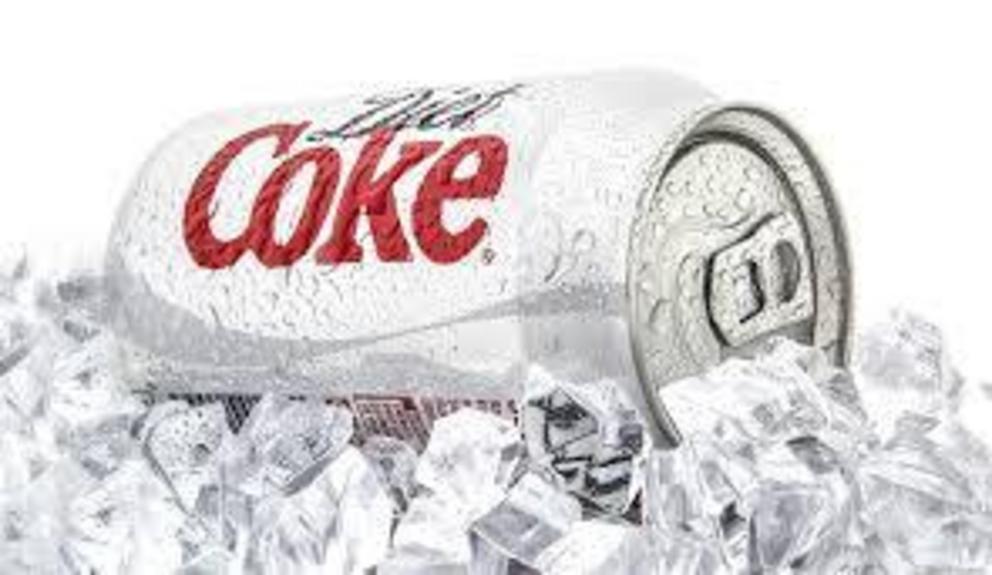Six ways diet soda can destroy your body
You know that the less processed sugar you eat, the better your health will be—which is why choosing diet soda seems like a less sinful way to enjoy a fizzy beverage. But while “diet” and zero-calorie drinks are marketed as healthier alternatives to soda, are artificial sweeteners really better for your body than processed sugar itself?
You may already know that diet soda is sweetened with artificial sugars, or non-nutritive sweeteners (NNS), such as aspartame, cyclamates, saccharin, sucralose and acesulfame potassium. These chemicals also go by the names NutraSweet, Splenda, Sweet’N Low, Equal, Sunett and Sweet One.
The appeal of artificial sweeteners is that they contain no calories and are said to be at least 300 times as sweet as sugar (1). This leads us to believe that “no calorie” sweet treats and beverages maintain their sweetness without causing weight gain or diabetes, like refined sugar does. But you know what they say: if something sounds too good to be true, it usually is.
Do you struggle with bloating, gas, constipation, or other digestive issues? We’ve created a FREE guide to healing your gut naturally.
Click here to get your FREE copy of our Digestion Guide!
If something sounds too good to be true, it usually is.
Soft drink brand companies also use media outlets to their advantage when it comes to channeling consumers towards artificially sweetened drinks. Many ads claim diet drinks are better for your health than the full sugar versions, and can help you lose weight and avoid the negative effects of refined sugar.
Now, considering that diet drinks are marketed towards health-conscious individuals and those who have blood sugar imbalances such as diabetes, it begs the question: How much do we know about the impact of artificial sweeteners on our health?
Processed sugar wreaks havoc on your health, but ingesting chemicals your body doesn’t recognize probably isn’t better. For starters, diet beverages have been on store shelves since the 1950s (although they became more popular in the 90s when low-carb diet trends exploded). To date, the FDA has only approved 6 of the artificial sweeteners found in these drinks (2). And let’s be honest: even with a stamp of approval from the FDA deeming something “safe for consumption,” a “safe” chemical or ingredient doesn’t necessarily mean health risks aren’t involved.
Processed sugar wreaks havoc on your health, but ingesting foreign chemicals isn’t any better.
Let’s take Yellow Dye #5 (also known as tartrazine), for example: a food coloring agent commonly added to yogurt, boxed snacks, beverages and macaroni and cheese. Yellow Dye #5 is FDA approved, but studies have linked the prolonged consumption of tartrazine to impaired learning and memory function (3). As you can see, “safe for consumption” doesn’t always translate to “good for your health.”
6 Health Risks of Drinking Diet Soda
So, what do we currently know about the health risks of drinking diet soda? Let’s take a looksie.
Diet Soda May Increase Risk of Type 2 Diabetes
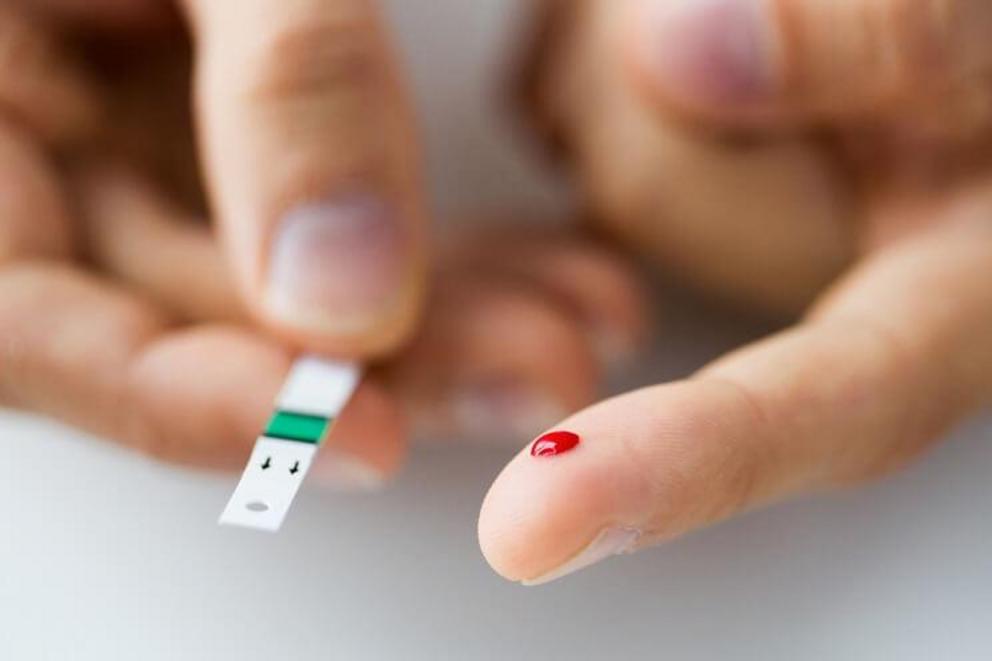
Wait a second: isn’t refined sugar (sucrose) the primary cause of blood sugar imbalances? Therefore, if diet soda doesn’t contain any sugar (or calories), how can it mess with your blood sugar levels?
Research suggests that despite artificial sweeteners being free from processed sugar, they may actually raise your blood sugar levels by disrupting the balance of probiotics in your gut (4). Since these friendly bacteria play a role in keeping your blood sugar regulated, depleting them may increase your chances of developing type 2 diabetes.
Diet Soda is Linked to Metabolic Syndrome

Diet soda has also been linked to an increased risk of metabolic syndrome, which is an umbrella term used to describe different types of type 2 diabetes and cardiovascular disease, including hyperglycemia, hypertension and dyslipidemia (5).
Since your metabolism refers to your body’s ability to break down and convert molecules from food to use and store energy, individuals who have metabolic syndrome generally exhibit high blood pressure, low HDL or “good” cholesterol, high triglyceride levels, excess body weight and larger waistlines (6). These conditions can further lead to heart disease, diabetes and strokes.
Diet soda drinkers have a 67% greater risk of developing type 2 diabetes.
In a study examining the effects of diet soda intake, individuals who consumed diet soda on a daily basis over two years saw a 36 percent greater risk of developing metabolic syndrome and 67 percent greater risk of developing type 2 diabetes as compared to individuals who didn’t consume artificially sweetened beverages (7).
Now, that’s not to say drinking diet soda is the exact cause of metabolic syndrome—it can simply increase your risk when consumed on a regular basis. Of course, other factors are involved in metabolic syndrome, such as high sodium intake, smoking, frequent alcohol consumption and lifestyle factors such as high stress levels and a lack of exercise.
Diet Soda Increases Sugar Cravings
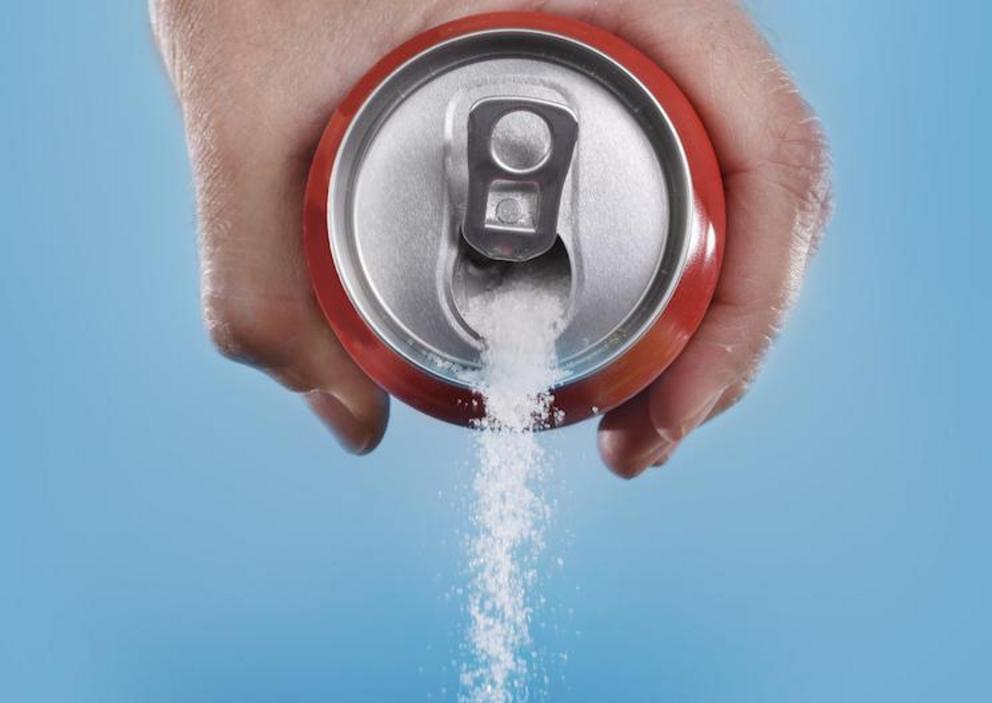
Artificial sweeteners may cause cravings for sugar by stimulating your “sweet taste” receptors and the hormones in your GI tract that regulate your hunger and satiety signals (8).
In other words, your digestive system gets “tricked” into thinking you’re about to eat a large, sugar-laden meal when you taste the intense sweetness of artificial sweeteners. Since this sugar source doesn’t actually contain calories or fit the biochemical makeup of glucose, your body may produce cravings for real sugar in order to get the food it thought was receiving in the first place.
Diet Soda May Cause Cardiovascular Disease

Although artificial sweeteners have been linked to metabolic syndrome, which can lead to cardiovascular disease, they may increase the risk of cardiovascular disease even when metabolic syndrome isn’t present.
According to a study published in the Journal of Internal Medicine, those who consumed diet soda on a daily basis for 10 years or more were shown to have an increased risk of cardiac disease and hypertension (9). This is even after sodium intake, smoking, weight and high cholesterol were accounted for as cardiovascular disease risk factors.
Diet Soda Promotes Weight Gain and Obesity
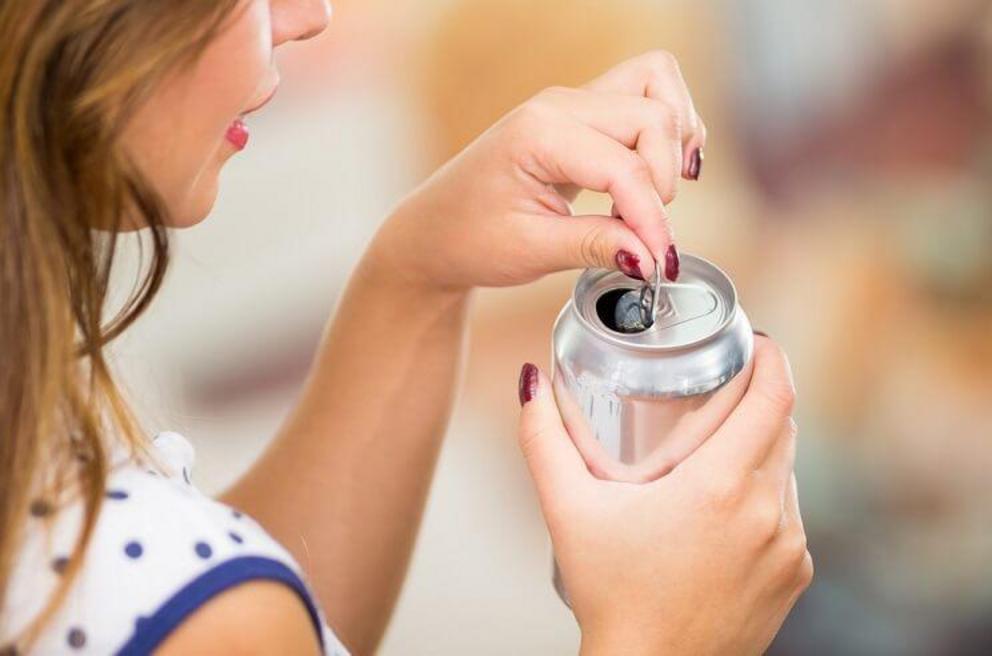
While many individuals who consume diet soda already struggle with their weight (and drink low or zero calorie soda to assist with their weight loss or maintenance), there is a link between the frequent consumption of diet soda and weight gain (10).
In a report on obesity conducted in the 1980s by the San Antonio Heart Study, results showed a correlation between consumption of NNS and weight increase (11). In the study, 3,682 adult participants were monitored over an 8-year period and matched against those who didn’t consume diet soda beverages. Diet soda drinkers were found to have higher body mass indexes (BMIs) than those who didn’t drink artificially sweetened beverages.
And to recap what’s already been mentioned: artificial sweeteners may negatively impact the healthy bacteria in your gut, interfere with blood sugar regulation, and cause cravings for more sugar—all of which are primary contributing factors in weight gain and obesity.
Diet Soda Can Change Eating Behaviors

Diet soda may cause changes in eating behaviors due to the altered reward processing of the sweet taste as perceived by the brain (12).
Dopamine and endogenous opioids are neurotransmitters that affect movement, motivation, reward and addiction areas of the brain. Forms of addiction like binging, cravings and withdrawals are behaviors that are linked to the same brain reward circuitry triggered by gratifying experiences like food, sex and drugs. By drinking diet soda, these neurotransmitters, which involve the reward response, are stimulated, causing cravings for more sweet substances.
Drinking diet soda can easily trigger a sugar binge.
In a study published by researchers at Princeton University in 2005, rats demonstrated binge eating behaviors after consuming refined sugar (sucrose). Although artificial sweeteners don’t activate the same food reward pathways that sucrose and naturally derived sugars do, NNS also creates food seeking behaviors and sugar dependencies because they’re so sweet.
So, even if you choose to imbibe in a diet Cola over that chocolate mousse made with white sugar, you may still find your sugar cravings heightened afterwards. Much like how sugar cravings can result from eating artificial sweeteners by being “tricked” into believing you’ve consumed refined sugar, your brain responds to the sweetness by wanting more. Therefore, even when the sugar is replaced with an artificial sweetener, your body’s response remains the same.
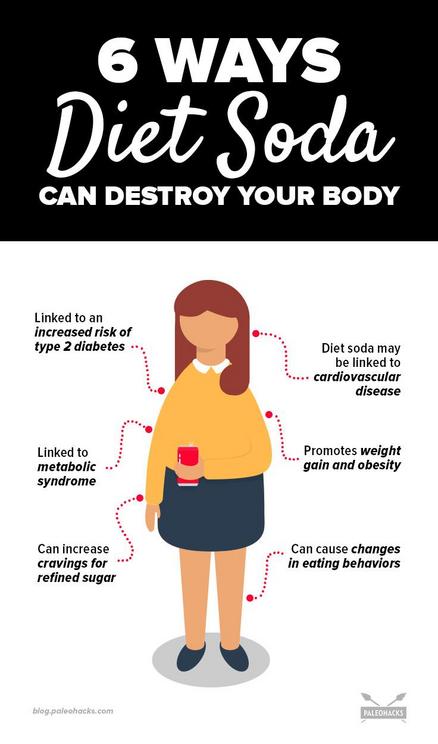
The Bottom Line
So, like many health claims, it seems that consumers have been seriously sugar-coated when it comes to the myths of diet soda. While refined sugar isn’t something you want to have in your diet, your body still recognizes what’s being ingested, rather than metabolizing chemicals that wind up as toxins in your bloodstream. So, instead of reaching for diet sodas to get your fix, opt for fizzy kombucha or Pellegrino with a twist of lime as a healthier alternative.

